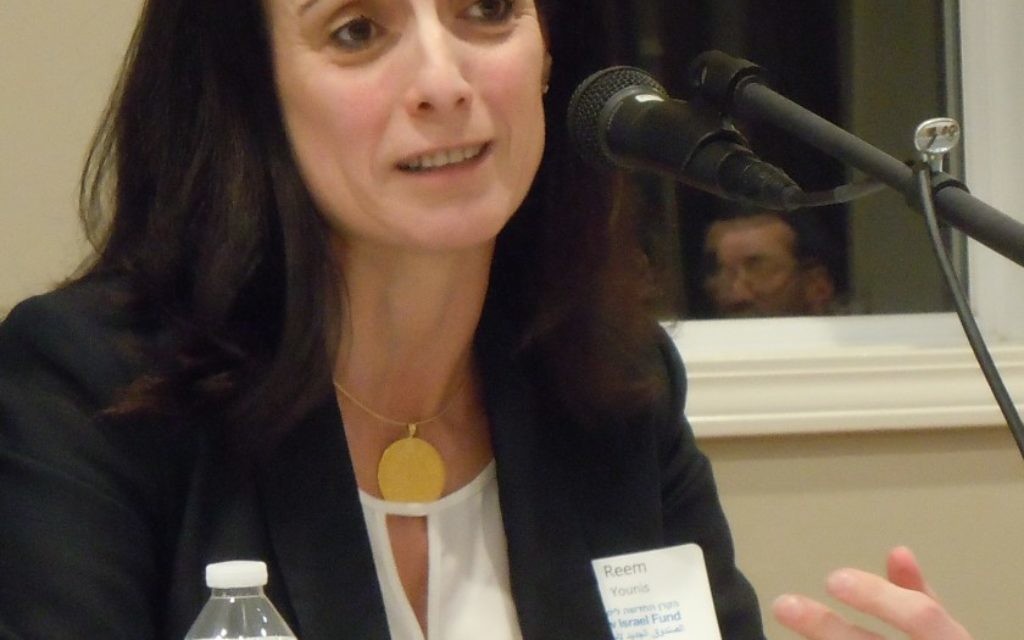Arab Entrepreneur Helps Engineer Israel’s Future
As an Arab Christian woman operating in Israel’s high-tech sector, it would be easy for Reem Younis to talk about politics and the Israeli-Palestinian conflict. Instead, the Nazareth native and co-founder of neuroscience company Alpha Omega is happy to leave the politics to others so she can focus on the three E’s she sees as the keys to the future: education, employment and entrepreneurship.
“I want our children to stay in Israel through their choice,” Younis said Wednesday night, March 2, at Congregation Bet Haverim in a visit organized by the New Israel Fund, of which she is a new board member. The event was a conversation between her and Central Atlanta Progress President A.J. Robinson.
Younis and her husband, Imad, founded Alpha Omega in Nazareth in 1993 as an engineering firm on the strength of Imad’s electric engineering degree and Reem’s civil engineering degree from the Technion. The business gradually moved into neuroscience and neurosurgery in areas such as deep brain stimulation to treat Parkinson’s.
Get The AJT Newsletter by email and never miss our top stories Free Sign Up

“I got into high tech through the back door,” she said. She once thought Alpha Omega would boom to 1,000 employees within a few years, but instead it is thriving and stable with a staff of about 70.
Her company sells a system that serves as a Global Positioning System for doctors working on the brain, Younis said, pointing to the United States, Europe and China as Alpha Omega’s primary markets. Exporting a system for poking around in brains made Younis nervous — she imagined something going wrong with a brain surgery halfway around the world — so the company opened foreign offices, including the U.S. headquarters in Alpharetta. That office helped Alpha Omega win Israel Company of the Year at the Conexx Eagle Star Awards in 2012.
But her focus is firmly on Nazareth and the economic development of the Arab community. Only 30 percent of Israeli Arab women are in the workforce, and Younis recognizes that she is a role model to help improve that labor participation rate and shape Israel’s future.
The Israeli government has acknowledged the need to improve its Arab citizens’ lives by boosting their participation in the high-tech startup nation, and it is spending $2.5 billion on Arab economic development projects over five years through 2020. Younis said her dream is for the Arab community to use that money wisely.
“We have a huge challenge with education. We’re not learning the exact subjects needed to work,” she said, noting that Israel faces a shortage of engineers but that Arab mothers want their children to be doctors, accountants and lawyers. With one lawyer for every 10 people in the Arab community, however, “we don’t need no lawyers.”
Service professionals such as lawyers and accountants are the easy route, however, because they allow Arabs to stay in their hometowns. Younis wants to see new college graduates work for big
high-tech companies in Tel Aviv and other parts of Israel’s thriving center, gain the technical and managerial skills, then return to areas in the periphery such as Nazareth to become tech entrepreneurs.
The goal is for educated, entrepreneurial people to stay in Israel and “make it a better place for everybody,” she said.
Younis is encouraged by what she has seen the past five years. She said more Arabs are feeling economically secure to launch tech businesses, assisted by incubators, and large high-tech companies are bringing jobs to Nazareth, the high-tech capital of Arab Israel.
Arabs and Jews are cooperating because most people on both sides just want to live in peace and make coexistence work, Younis said. “We don’t have the luxury of despair, so we have to keep dreaming.”






comments